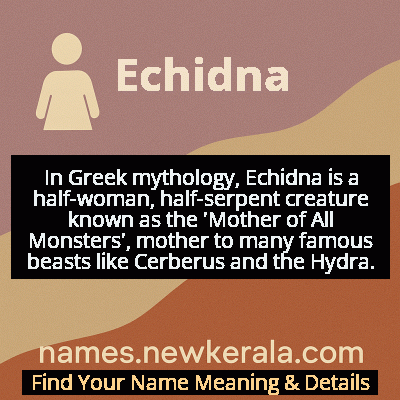Echidna Name Meaning & Details
Origin, Popularity, Numerology Analysis & Name Meaning of Echidna
Discover the origin, meaning, and cultural significance of the name ECHIDNA. Delve into its historical roots and explore the lasting impact it has had on communities and traditions.
Name
Echidna
Gender
Female
Origin
Greek
Lucky Number
8
Meaning of the Name - Echidna
In Greek mythology, Echidna is a half-woman, half-serpent creature known as the 'Mother of All Monsters', mother to many famous beasts like Cerberus and the Hydra.
Echidna - Complete Numerology Analysis
Your Numerology Number
Based on Pythagorean Numerology System
Ruling Planet
Saturn
Positive Nature
Ambitious, efficient, realistic, and authoritative.
Negative Traits
Materialistic, stressed, confrontational, and can be overly ambitious.
Lucky Colours
Dark blue, black.
Lucky Days
Saturday.
Lucky Stones
Blue sapphire, amethyst.
Harmony Numbers
2, 4, 6.
Best Suited Professions
Business leaders, managers, financial services, law enforcement.
What People Like About You
Leadership, determination, organizational skills.
Famous People Named Echidna
Echidna (Mythological)
Primordial Deity/Monster
Mother of most major Greek monsters including Cerberus, Hydra, Chimera, and Sphinx
Echidna (Scientific)
Biological Namesake
Namesake for the spiny anteater due to its mythological hybrid nature
Echidna (Literary)
Fantasy Character
Appears in Rick Riordan's 'Percy Jackson' series and other modern fantasy works
Name Variations & International Equivalents
Click on blue names to explore their detailed meanings. Gray names with will be available soon.
Cultural & Historical Significance
Her mythological role represents the chaotic, untamed forces of nature that civilization and heroism must overcome. The name Echidna itself means 'viper' or 'she-viper,' reflecting her serpentine nature and connection to the earth's primal energies. In modern times, her legacy continues through the naming of the echidna mammal, chosen by naturalists who saw parallels between the animal's unusual hybrid appearance (mammal that lays eggs) and the mythological creature's mixed nature. This biological namesake has helped maintain cultural awareness of the mythological figure in contemporary society.
Extended Personality Analysis
Individuals named Echidna are often perceived as possessing a dual nature - combining striking beauty or charm with formidable inner strength and complexity. They typically exhibit strong maternal instincts and protective qualities, much like the mythological Echidna who fiercely guarded her monstrous offspring. These individuals often demonstrate remarkable resilience and adaptability, able to thrive in challenging environments that would overwhelm others. Their personality often includes a mysterious, enigmatic quality that draws others to them while maintaining an air of independence and self-sufficiency.
People with this name frequently show creative problem-solving abilities and unconventional thinking patterns, approaching challenges from unique perspectives that others might overlook. They tend to be deeply intuitive and perceptive, with an ability to understand complex situations and people's hidden motivations. While they can appear solitary or reserved, those who earn their trust discover loyal, fiercely protective companions who will defend their loved ones with extraordinary determination. Their strength often lies in their ability to transform perceived weaknesses into powerful assets, much like the mythological Echidna who turned her monstrous nature into a source of legendary power and influence.
Modern Usage & Popularity
In contemporary naming practices, Echidna remains an exceptionally rare and unconventional choice, typically selected by parents with strong interests in mythology, classical studies, or unique names. The name appears almost exclusively in countries with strong classical education traditions, particularly Greece, Italy, and among academic communities worldwide. According to global naming databases, Echidna appears in fewer than 0.001% of birth records, making it one of the rarest mythological names in use today. Its usage peaked briefly in the early 2000s following increased popularity of mythological names in fantasy literature and media. Modern parents who choose this name often appreciate its powerful mythological associations and distinctive sound, though many are aware of the challenging nature of the original mythological figure. The name has found some acceptance in the fantasy and gaming communities, where mythological names are more commonly embraced. Interestingly, while the name remains rare for humans, it has gained recognition through the Australian mammal that shares its name, giving it some modern ecological relevance.
Symbolic & Spiritual Meanings
Echidna symbolizes the powerful duality of nature - the beautiful and the terrifying coexisting in a single entity. She represents primal feminine power, maternal protection, and the untamed forces of the natural world that exist beyond human control. Metaphorically, Echidna embodies transformation and adaptation, demonstrating how perceived monstrous qualities can become sources of strength and resilience. Her symbolism extends to concepts of fertility and creation, as she gave birth to numerous legendary creatures that became central to Greek heroic narratives. In psychological terms, Echidna represents the shadow self - the parts of our personality we may fear or reject, but which contain immense power and potential. She symbolizes the integration of opposites: human and animal, beautiful and terrifying, creative and destructive. Modern interpretations often view Echidna as a symbol of environmental consciousness, representing nature's ability to produce both wondrous and fearsome creations. Her enduring mythological presence serves as a reminder that true power often lies in embracing complexity and contradiction rather than seeking simple, one-dimensional identities.

